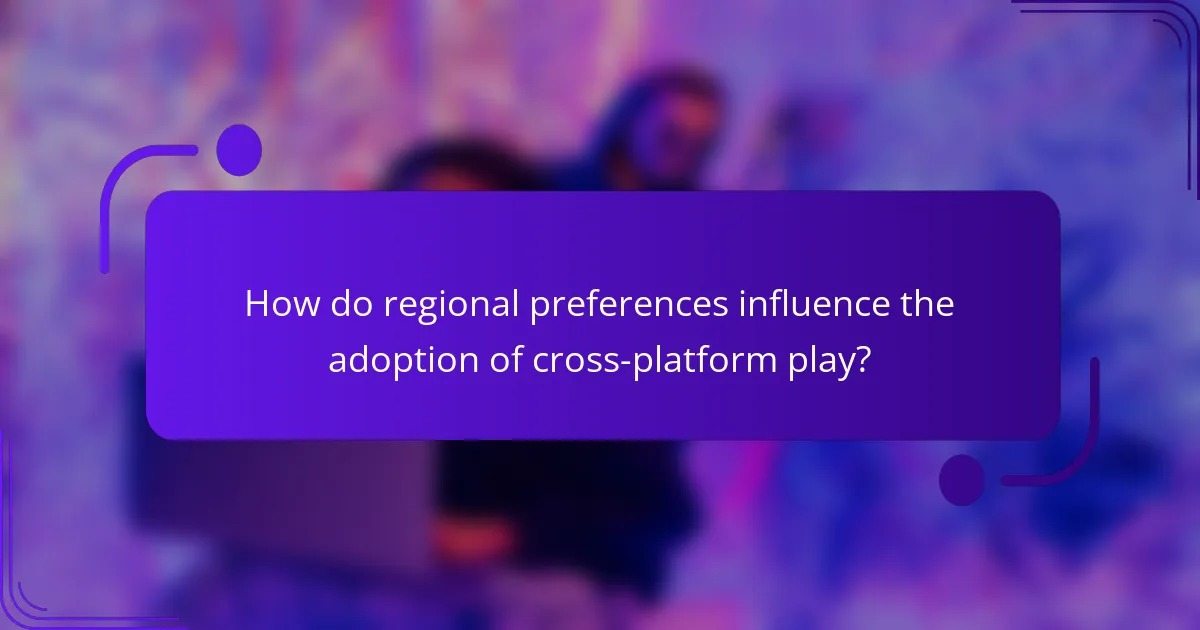Cross-platform play in multiplayer fantasy adventure games enhances player connectivity and collaboration across devices. This article explores the benefits of inclusivity, the challenges developers face, the importance of community engagement, unique gameplay aspects, and regional influences on adoption. Additionally, it provides strategic practices for players to excel in this dynamic environment.

How does cross-platform play enhance the multiplayer experience in fantasy adventure games?
Cross-platform play significantly enhances the multiplayer experience in fantasy adventure games by allowing players on different devices to connect and collaborate seamlessly. This inclusivity fosters a larger player base, leading to more dynamic interactions and richer gameplay experiences. Players can team up with friends regardless of their platform, enhancing social connections and community engagement. As a result, game developers can create more diverse and complex worlds, knowing that a broader audience can explore them together. This shared experience not only increases player satisfaction but also extends the game’s lifespan through sustained engagement and community-driven content.
What are the core benefits of cross-platform play for players?
Cross-platform play enhances player experience by increasing accessibility, expanding social interactions, and fostering a larger player base. Players can connect with friends on different platforms, ensuring a more inclusive gaming environment. This feature also promotes longevity in games, as a diverse community can lead to more consistent engagement. Ultimately, cross-platform play enriches multiplayer fantasy adventure games by breaking down barriers between platforms.
Which platforms support cross-platform play in popular fantasy adventure games?
Several platforms support cross-platform play in popular fantasy adventure games, enhancing player connectivity. Notable examples include:
| Game Title | Supported Platforms |
|————————–|—————————————–|
| Fortnite | PC, Xbox, PlayStation, Nintendo Switch |
| Genshin Impact | PC, Mobile, PlayStation |
| Dauntless | PC, Xbox, PlayStation, Nintendo Switch |
| Monster Hunter: World | PC, Xbox, PlayStation |
| Final Fantasy XIV | PC, PlayStation |
| Warframe | PC, Xbox, PlayStation, Nintendo Switch |
These games allow users on different systems to play together, promoting a more inclusive gaming experience.

What challenges do developers face in implementing cross-platform play?
Developers face several challenges in implementing cross-platform play in multiplayer fantasy adventure games. Key issues include technical limitations, differing platform capabilities, and maintaining game balance.
Technical limitations arise from the need for seamless integration across various systems, which can complicate development. Differing platform capabilities can lead to inconsistent player experiences, as each platform may have unique features and performance metrics.
Maintaining game balance is crucial; developers must ensure that players on different platforms have equitable experiences. This often involves adjusting gameplay mechanics and performance parameters to accommodate varying hardware specifications.
Additionally, community management becomes challenging as developers must address platform-specific concerns and player feedback effectively.
How do technical limitations affect cross-platform functionality?
Technical limitations significantly hinder cross-platform functionality in multiplayer fantasy adventure games. These limitations can arise from differences in hardware capabilities, software compatibility, and network infrastructure. For example, varying graphics processing power between platforms can lead to inconsistent visual experiences. Additionally, differing control schemes may create challenges in gameplay balance and user experience. Network latency and bandwidth restrictions can impact real-time interactions, causing delays or disconnections. Such technical barriers can ultimately fragment player communities and reduce overall engagement.
What are the common compatibility issues between different platforms?
Cross-platform play in multiplayer fantasy adventure games often faces compatibility issues due to differences in hardware, software versions, and user interfaces. These factors can lead to problems such as mismatched graphics quality, varying frame rates, and inconsistent gameplay experiences.
Common compatibility issues include:
1. **Hardware Limitations**: Different platforms may have varying processing power, affecting game performance.
2. **Software Updates**: Inconsistent game versions across platforms can lead to bugs and access issues.
3. **Control Schemes**: Different input methods can create disparities in gameplay, impacting user experience.
4. **Network Protocols**: Variations in online connectivity can cause lag or disconnections during multiplayer sessions.
5. **Content Availability**: Certain platforms may have exclusive content, limiting player interactions.
6. **Account Linking**: Issues with linking accounts across platforms can restrict access to purchased content or progress.

Why is community engagement important in cross-platform multiplayer games?
Community engagement is crucial in cross-platform multiplayer games as it enhances player experience and fosters a sense of belonging. Engaged communities contribute to game longevity and player retention. They provide valuable feedback, helping developers improve gameplay and address issues. Active communication channels enable players to connect across platforms, enriching social interactions. Furthermore, community-driven events and initiatives can boost player participation, creating a vibrant ecosystem. Ultimately, strong community engagement leads to a more enjoyable and immersive gaming environment.
How do player demographics differ across platforms in fantasy adventure games?
Player demographics in fantasy adventure games vary significantly across platforms, influenced by accessibility and gameplay styles. Console players often skew towards younger audiences, while PC gamers tend to be more diverse in age. Mobile platforms attract casual gamers, leading to a higher female player percentage.
Factors such as platform exclusivity and community engagement also shape demographics. For example, cross-platform capabilities enhance player interaction, fostering a mixed demographic. As a result, understanding these differences helps developers tailor experiences to each platform’s audience.
What role does social interaction play in enhancing gameplay?
Social interaction significantly enhances gameplay by fostering collaboration and competition among players. Engaging with others in cross-platform multiplayer fantasy adventure games promotes teamwork, strategy development, and social bonding. Players can share experiences, tips, and resources, enriching the overall gaming experience. This interaction often leads to increased player retention and satisfaction, as forming alliances and friendships can make gameplay more enjoyable and immersive. Additionally, social features like chat and voice communication allow for real-time collaboration, which can be crucial for completing challenging quests or defeating powerful enemies.

Which unique features distinguish cross-platform play in specific fantasy adventure games?
Cross-platform play in multiplayer fantasy adventure games features unique aspects that enhance player experience. Notable distinctions include seamless gameplay across devices, enabling diverse player interactions. Games like “Final Fantasy XIV” allow players on PC and consoles to team up, fostering a unified gaming community. Unique matchmaking algorithms ensure balanced teams regardless of platform, enhancing competitive play. Additionally, cross-platform progression allows players to maintain their game progress across different devices, providing flexibility and convenience. These features collectively enrich the gaming experience, making it more inclusive and engaging for all players.
How do exclusive events or content affect cross-platform participation?
Exclusive events or content significantly boost cross-platform participation by attracting diverse player bases. These events create a sense of urgency and exclusivity, encouraging players to engage across multiple platforms. For instance, limited-time quests or cross-platform rewards enhance player interaction and community building. As a result, players are more likely to explore different platforms to access unique content, fostering a unified gaming experience. This approach not only increases player retention but also expands the game’s reach, creating a vibrant multiplayer environment.
What are the unique gameplay mechanics that benefit from cross-platform play?
Cross-platform play enhances multiplayer fantasy adventure games by enabling diverse gameplay mechanics. Unique mechanics include synchronized progression, allowing players on different platforms to advance together. Shared quests foster collaboration, enhancing player interaction regardless of device. Cross-platform matchmaking optimizes player pools, ensuring balanced competition. Additionally, unified economies allow resource sharing, enriching the overall gaming experience. These features collectively deepen engagement and community within the game.

What are the implications of cross-platform play on game balance and fairness?
Cross-platform play enhances game balance and fairness by creating a unified player base. This inclusion reduces matchmaking disparities, allowing players on different platforms to compete equally. Additionally, it fosters a more vibrant community, as players can interact regardless of their device. However, varying input methods may create unique challenges, such as differences in response times and control precision, potentially affecting gameplay balance. Game developers must address these disparities to maintain fairness across platforms.
How do different control schemes impact player performance across platforms?
Different control schemes significantly impact player performance in cross-platform multiplayer fantasy adventure games. Players using traditional controllers often achieve better precision than those using touch screens.
Control schemes can affect response times, accuracy, and overall gameplay experience. For instance, mouse and keyboard setups typically provide faster input and more control over character movements compared to gamepads. Additionally, the layout of buttons and sensitivity settings can influence how effectively players execute complex maneuvers.
Players may adapt differently to control schemes based on their prior experience. Those familiar with console gaming may find it challenging to transition to keyboard and mouse setups, impacting their performance. Conversely, players accustomed to touch controls might excel in mobile environments but struggle on consoles or PCs.
Cross-platform play can create disparities in performance, highlighting the importance of optimizing control schemes for various platforms to ensure a balanced gaming experience.
What measures are in place to ensure fair competition in cross-platform environments?
Fair competition in cross-platform environments is ensured through several key measures. Developers implement standardized matchmaking algorithms to balance player skills across platforms. Regular updates address disparities in gameplay mechanics, ensuring consistency. Additionally, cross-platform play policies promote equitable access to in-game resources, fostering a level playing field. Transparency in player reporting and moderation helps maintain fair interactions. These measures collectively uphold the integrity of multiplayer fantasy adventure games.

How do regional preferences influence the adoption of cross-platform play?
Regional preferences significantly shape the adoption of cross-platform play in multiplayer fantasy adventure games. Cultural differences influence player expectations regarding gameplay, social interaction, and competition. For instance, regions with a strong emphasis on community collaboration may favor cross-platform features that enhance cooperative play. Conversely, areas prioritizing competitive gaming might resist cross-platform options due to concerns over fairness and balance. Additionally, local gaming regulations and platform availability can further impact adoption rates. Understanding these regional nuances helps developers tailor their offerings to meet diverse player needs effectively.
What are the popular fantasy adventure games in different regions with cross-platform capabilities?
Popular fantasy adventure games with cross-platform capabilities include “Genshin Impact,” “Dauntless,” and “Final Fantasy XIV.” These games allow players across various devices to team up seamlessly.
“Genshin Impact” features an expansive open world and cooperative multiplayer. “Dauntless” emphasizes monster hunting with friends. “Final Fantasy XIV” offers a rich narrative and large player community across platforms.
These titles exemplify the growing trend of cross-platform play in the fantasy adventure genre, enhancing accessibility and community engagement.
How do cultural factors shape player behavior in cross-platform settings?
Cultural factors significantly influence player behavior in cross-platform multiplayer fantasy adventure games. Players from different cultures exhibit varying communication styles, teamwork approaches, and conflict resolution strategies. For example, collectivist cultures may prioritize group success, while individualist cultures might focus on personal achievement. These differences can affect gameplay dynamics, social interactions, and overall enjoyment. Understanding these cultural nuances enhances game design and player experience, fostering inclusivity and engagement across diverse gaming communities.

What are best practices for players engaging in cross-platform multiplayer fantasy adventure games?
To excel in cross-platform multiplayer fantasy adventure games, players should adopt strategic practices. Prioritize communication with teammates to coordinate effectively. Optimize character builds by understanding platform-specific mechanics. Regularly update game knowledge to stay competitive across different systems. Engage in community discussions for tips and strategies.
How can players optimize their experience across different platforms?
Players can optimize their experience across different platforms by ensuring cross-platform compatibility, adjusting settings for performance, and utilizing communication tools.
First, select games that support cross-platform play, allowing seamless interaction with friends across devices. Next, adjust graphics and control settings to enhance performance on each platform, ensuring smooth gameplay. Finally, use voice chat or messaging apps to coordinate strategies and maintain communication, enhancing teamwork and overall enjoyment.
What common mistakes should players avoid when participating in cross-platform play?
Players should avoid common mistakes like poor communication, misunderstanding platform capabilities, neglecting cross-play settings, and ignoring latency differences. Effective teamwork is crucial in cross-platform play.
Miscommunication often leads to confusion about strategies and roles. Each platform may have unique features or controls that players should familiarize themselves with. Adjusting settings for cross-play compatibility can enhance the experience. Additionally, players must consider latency issues that may affect gameplay.